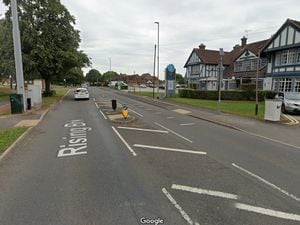Black Country mental health service "must make improvements" after CQC inspection
A mental health service in the Black Country has been told by a health watchdog that it must make improvements after reports of safeguarding incidents.

The Care Quality Commission (CQC) inspected the mental health wards at Black Country Healthcare NHS Foundation Trust in February, following allegations concerning Wolverhampton's Penn Hospital.
In an incident which was reportedly captured on CCTV, hospital workers slept in a patient's bed while he was left lying on the floor.
The footage reportedly showed the 53-year-old patient left on the floor all night while a member of staff slept in his bed for two hours, used his toilet, prayed in his room and engaged in another inappropriate activity.
In another allegation which was reported to the police, staff members were accused of dragging the same man across the floor and manhandling him into a chair.
After the allegations surfaced in January, the CQC said it had been notified of concerns relating to staff behaviour by the trust and launched an inspection of the Trust's mental health services in February.
Following the inspection, the overall rating for the service has moved down from good to requires improvement.
The areas of effective, well-led and responsive have also moved down from good to requires improvement, caring remains as good, and safe remains requires improvement.
The report comes as new figures reveal that black patients in the Black Country are four times as likely as white patients to be detained under the Mental Health Act.
Inspectors found the following during this inspection:
The service didn’t always have a bed available for someone who would benefit from admission and patients were not always discharged promptly once their condition warranted this.
Some people didn’t have one to one time with their named nurse
The ward teams didn’t always have access to the full range of specialists required to meet people’s needs
Ward staff didn’t always work well together as a multidisciplinary team and with community teams and external providers
The trust had not trained all staff in immediate life support
However, inspectors also pointed out:
People said staff were kind, caring and interested in them, they said staff knocked on their door before entering and treated them with respect.
Staff followed good practice with respect to safeguarding.
The trust had reduced the staff turnover rates across the wards.
Staff engaged in clinical audits to evaluate the quality of care they provided.
Staff understood and discharged their roles and responsibilities under the Mental Health Act 1983 and the Mental Capacity Act 2005.
Andy Brand, CQC’s deputy director of operations in the Midlands, said: “When we inspected this service, whilst we saw a strong and supported workforce that felt proud to work for the trust, some improvements were needed to ensure people were receiving appropriate care.
“It was concerning that people sometimes had their escorted leave or activities cancelled and some wards didn’t have enough occupational therapists or activity staff. This meant people didn’t receive the treatment they needed to support their discharge from hospital, or have their wellbeing needs met.
“In addition, people’s care plans weren’t always updated or reviewed effectively which impacted the care they received. We saw examples where people’s health needs or medication had changed but nothing had been noted in their plan meaning staff wouldn’t be delivering the correct care.
“However, we did also see some positive areas of care. For example, people told us staff were very caring and always treated them with respect. Relatives said staff were helpful and kept them updated regularly on their family member.
“We also noted that staff assessed and managed risk well and minimised the use of restrictive practices on people. Staff also knew about any potential ligature anchor points that people could use to self-harm and mitigated these risks to keep people safe.
“We will continue to monitor the trust, including through future inspections, to ensure the necessary improvements are made so people can receive safe and appropriate care.”
Responding to the watchdog's report, Marsha Foster, Chief Executive at Black Country Healthcare NHS Foundation Trust said: "We welcome the feedback received in report and take the required actions very seriously.
"We are committed to improving our services and are taking necessary steps to address the issues raised.
"We have developed a comprehensive plan to increase training compliance and we continue to work closely with staff to improve the quality of care we provide.
“We acknowledge that there are areas where we need to improve and have already begun working diligently to address these issues.
"Our adult inpatient services, in particular, have experienced a number of challenges over the past six months, and we continue to work closely with the CQC and partners to implement the improvements that have been identified.
"We are also really pleased that inspectors observed examples of good care and received positive feedback from staff and patients.
"The Trust's overall rating remains 'good', and I would like to thank staff for their continued hard work and commitment.
"They do an incredible job, and I am confident that together we will continue to build on our strengths and achievements and make the improvements required."





